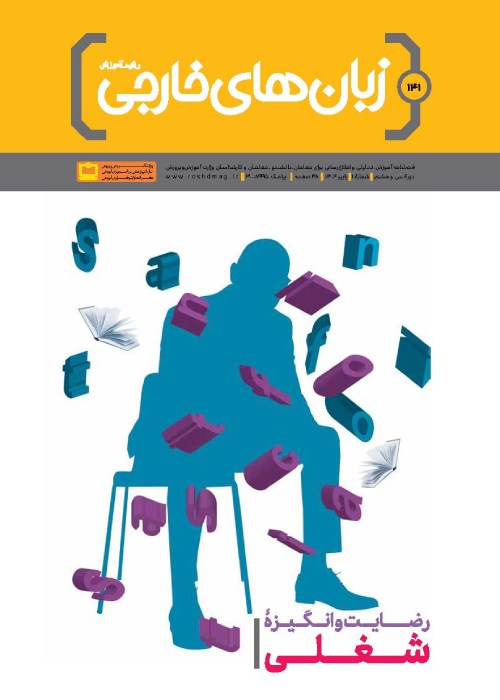فهرست مطالب
نشریه رشد آموزش زبان های خارجی
پیاپی 138 (زمستان 1401)
- تاریخ انتشار: 1402/02/09
- تعداد عناوین: 13
- سخن سردبیر
-
صفحات 2-3
- پژوهش
- معلم خلاق
- پژوهش
- گزارش، مصاحبه، رویداد
-
تفاوت های فردی و سبک های یادگیری در آموزش زبان انگلیسی: چالش ها و نکته ها / مصاحبه با سرکار خانم دکتر افسانه دهنادصفحات 18-20
-
Pages 1-4
The concept of learning styles as preferences and inclinations towards or constant ways that learners respond to educational stimuli (e.g., teachers’ presentation and input, instructional content, and textbooks) have been the forum of great discussions and debates. These debates range in focus from those that concentrate on the effectiveness of these styles for learning to those that call learning style efficacy a myth. While many studies have found relationships between learning styles and learning success and many students have been gravitated toward the topic, recent research has made clear that there is no evidence for their effectiveness and existence. This paper tries to examine these criticisms against the concept of learning styles and some substituted advocated by scholars in the field of education
Keywords: learning styles, educational stimuli, learning success, education, learner -
Pages 5-8
National University Entrance Examination (i.e., Konkoor) has been a much debated topic in Iranian foreign language teaching and research. There were arguments about the negative impact of this high-stakes exam on teaching and learning of different subject matters including English. A number of teachers and researchers believe that high stakes exams promote teaching for assessment in many educational contexts. After years of controversy, finally, National Education Assessment Organization (NEAO) announced that the general courses including English language will be excluded from Konkoor from 2023. After a quick introduction of Konkoor, its overall design, and its impact on the teaching of the different subject areas in Iranian educational system, the paper discusses the possible impact of excluding English language from National University Entrance Examination on its instruction in Iran.
Keywords: Konkoor, high-stakes exams, teaching for assessment, Iranianeducational system, language instruction -
Pages 9-15
tool to Iranian EFL learners’ writing ability and their attitude toward writing. The participants included 24 advanced level learners who were divided into control and experimental groups. The data were collected from a demographic questionnaire, a TOEFL placement test, TOEFL iBT writing proficiency and achievement tests, and an attitude questionnaire. The results showed that the students perceived writing in Blogfa effective for the development of their writing proficiency and their attitudes toward writing. The students also found blogging productive for expressing ideas without any pressure, writing for an audience, creating active/interactive social exchanges, and receiving comments from real time readership. These findings suggest that blogging can be motivating for learners and promote authorship, readership, and writing skills.
Keywords: weblog, attitude, writing proficiency, EFL learners, communicationmediatedtool -
Pages 16-19
With the ever-growing interest in using technology for a variety of pedagogical purposes, the teachers get empowered to enrich the learning environments by adapting them to the students’ learning priorities as they follow different learning routes to the same learning destination. The emerging digital technologies have created new learner types with their self-defined learning boundaries. In such a context, teachers are expected to update their teaching methods based on the evolving technology-mediated learning strategies of this group of learners or the digital generation. The present article introduces the new and different generation of language learners
Keywords: pedagogical purposes, learning environments, learning priorities, digitaltechnologies, learner types -
Pages 20-23
Le terme style d'apprentissage renvoie à un ensemble individuel de différences qui incluent non seulement une préférence personnelle exprimée concernant l'enseignement ou une association avec une forme particulière d'activité d'apprentissage, mais aussi à des différences individuelles que l'on retrouve en psychologie de l'intelligence ou de la personnalité (Reid, 1987). Cette recherche vise à étudier la variation du style d'apprentissage chez les apprenants et examiner l'influence de celles-ci sur la performance des apprenants concernant la compétence de la compréhension orale. Les résultats de la comparaison de la performance des quatre groupes dans le test ont montré que le score moyen du groupe de théoriciens était plus élevé dans les questions d'association ainsi que les questions à choix multiples. Les réflecteurs dépassaient d'autres types d'items comme les questions alternatives et les pragmatistes ont obtenu de meilleurs scores dans les items à réponse courte.
Keywords: styles d'apprentissage, compréhension orale, FLE, Iran, individuel dedifférences -
Pages 26-27


